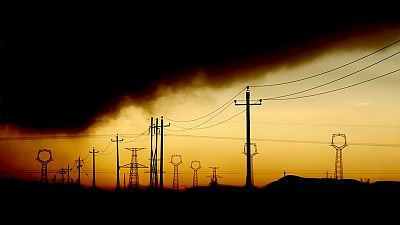The world's easiest to live is from the IDI index of the "Norway" World Economic Forum

Byliknes
Submitted at the Annual Meeting of the World Economic Forum (WEF) in 2018Results of activities and important findingsAccording to the economic index, "Norway is the most excellent country for the people in the world". The WEF is an international organization that tackles the improvement of social problems around the world, and the annual general meeting attracts top leaders such as intellectuals, journalists, multinational corporate managers and international political leaders, and the world faces It is a place to discuss serious problems.
The Inclusive Development Index 2018 - Reports - World Economic Forum
http://reports.weforum.org/the-inclusive-development-index-2018/results-and-key-findings/
Davos 2018: Norway is the best country in the world to live, according to the WEF? Quartz
https://qz.com/1189762/davos-2018-norway-is-the-best-country-in-the-world-to-live-according-to-the-wef/
This result was calculated using the index "The Inclusive Development Index" (IDI) which is different from the gross domestic product (GDP). IDI is a new indicator of national economic performance that focused on the public's standard of living and the future protection of the economy, and it was launched by the WEF as an alternative to GDP. WEFDocumentAccording to the following, the ranking of the ten countries with advanced IDI is high as follows. The IDI score representing the IDI score is represented from the lowest point "1.0" to the highest point "7.0".
◆Advanced Country The Inclusive Development Index (IDI) Index Top 10 Countries
First place:Norway (IDI score: 6.08, GDP ranking per capita: 2nd place)
Second place:Iceland (IDI score: 6.07, GDP ranking per capita: 12th place)
3rd place:Luxembourg (IDI score: 6.07, GDP ranking per capita: 1st place)
4th:Switzerland (IDI score:, 6.05, GDP ranking per capita: third place)
5th place:Denmark (IDI score: 5.81, GDP ranking per capita: 5th place)
6th place:Sweden (IDI score: 5.76, GDP ranking per capita: 6th place)
7th place:Netherlands (IDI score: 5.61, GDP ranking per capita: 10th place)
8th place:Ireland (IDI score: 5.44, GDP ranking per capita: 4th place)
9th place:Australia (IDI score: 5.36, GDP ranking per capita: 7th place)
10th:Austria (IDI score: 5.35, GDP ranking per capita: 13th place)
In the document, the ranking in GDP per citizen is listed along with the IDI index ranking. In the case of Norway of No. 1, it is "No. 1 in the ranking of IDI, 2nd in the ranking of IDI score GDP", but Iceland 2nd is "ranked second in the ranking of IDI and ranked second in GDP" and 12 It is interesting that the results of IDI and GDP per person are different. The color of the IDI ranking part shows the magnitude of the distance from GDP per capita in color, and green has the highest degree of dissociation.
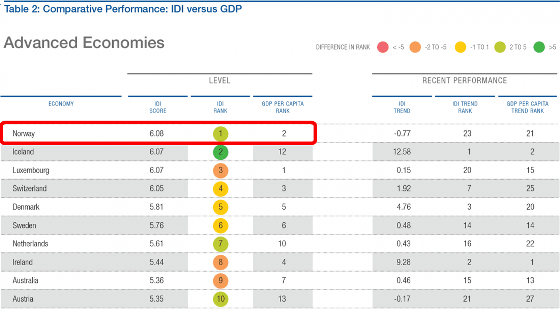
The ranking in IDI in Japan is 24th. The IDI score is 4.53, and the per capita GDP is 14th place. The ID is ranked 23rd in the IDI ranking up, the IDI score is 4.60, and the GDP per citizen is 9th.
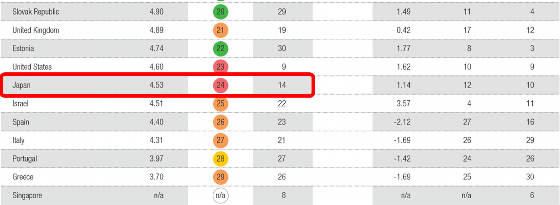
Three major core indices are used to calculate IDI: "Growth and Development", "Inclusion", "Intergenerational Equity and Sustainability", "Intergenerational Equity and Sustainability" I will. Each of these three central indices is scaled by the following factors. "Growth and development" is a measure determined by GDP per capita, mainly labor productivity, employment, healthy average life expectancy, etc.

ByJohn Pederson
"Inclusion"Gini coefficientAnd the average income of households, etc. "Scale of poverty wealth and income inequality".
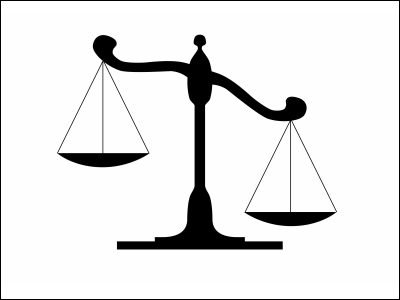
"Intergenerational Equity and Sustainability" is calculated from fields such as public debt, carbon intensity relative to GDP (carbon dioxide emissions relative to energy consumption), depletion of natural resources It is a measure.

By401 (K) 2012
WEFDocumentAccording to the breakdown of items for which Norwegian IDI is calculated, the number of green numbers representing the top 20% is included in all items of "Growth and Development", "Inclusion", "Intergenerational Equity and Sustainability" You can see that there is.
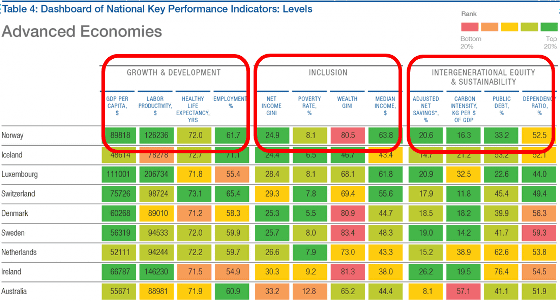
Overseas MediaQuartzAccording to the WEF, he considers GDP to be "a narrow scale of view on economic activity", "I do not think that the high index of GDP is directly linked to the high interests of citizens" And that. For example, even if a factory that spews pollution makes a person within 10 km radius intoxication poisoning, it is an economically good practice from the viewpoint of GDP, the number of visits to doctors and hospitals has increased, the funeral home is busy There is a possibility that becoming "being a good work for GDP".

Many economists and business analysts in the United States place the most emphasis on economic data and GDP and little information on other information is noticed. The GDP movement will instruct the central bank to loosen or discount currency distribution and to tighten. Voters judge the government's work based on whether GDP is rising fast enough. Analysts will judge according to whether the government 's economic stimulus measures will "influence GDP".
However, many research groups argue that obsession with GDP is foolish, and the idea of "IDI" listed by the WEF has the potential to cast a stone on the obsession with GDP. The WEF stated that a comprehensive development index (IDI) should be used and according to the WEF, 29 developed countries pushed the score of "growth and development" by 3% or more in the past five years, In terms of "comprehensiveness" of the IDI index, they do not lead to growth, and income disparity is expanding.

ByChris Richards
As mentioned earlier, the WEF considers the world's most comprehensive developed economy to be Norway. This is because "coexistence and sustainability among generations" is a good result, because the other two central indices "growth and development" and "inclusivity" are also high levels. In addition, the top of the IDI index ranking is occupied by smaller European countries such as Iceland, Luxembourg and Switzerland, and the only non European country in the top ten is Australia (ninth). Among the G7 countries, Germany (12th) was the highest, followed by Canada (17th), France (18th), Britain (21st), the United States (23rd), Japan (24th), Italy (27th ) Is followed.
This ranking has the same aspect as discussion about the American health care system. Neo-liberal welfare medical is too expensive, many people can not receive medical care. In order to become a state with a comprehensive developed economy, it can be said that not only economic growth but also welfare state system, coexistence between generations and sustainability are necessary.
Related Posts:
in Note, Posted by darkhorse_log





